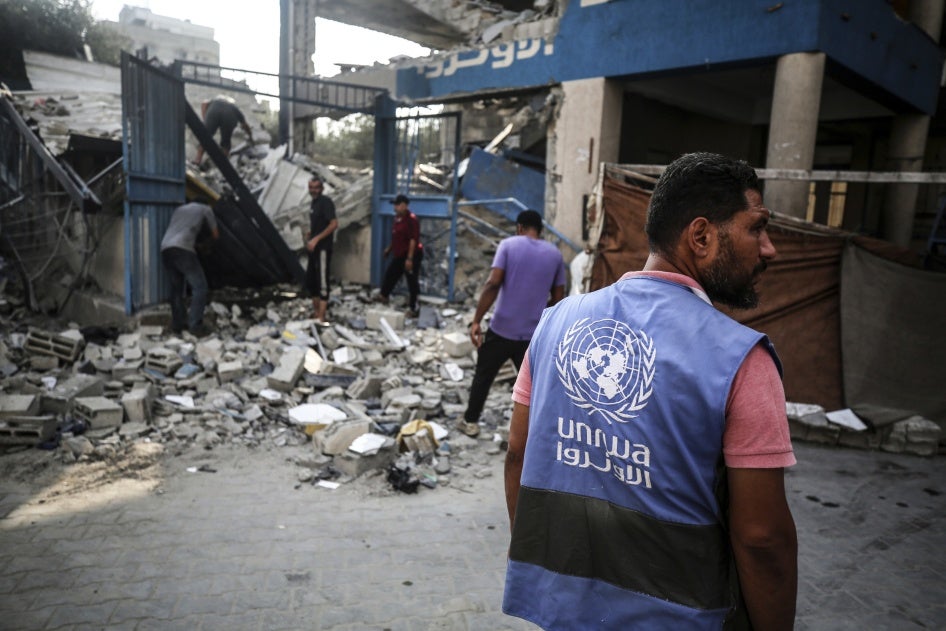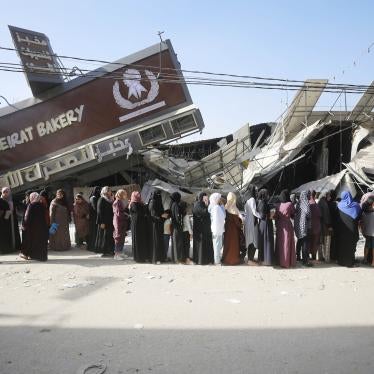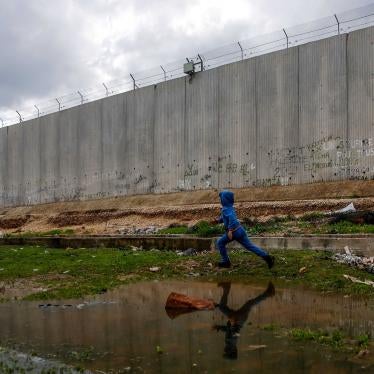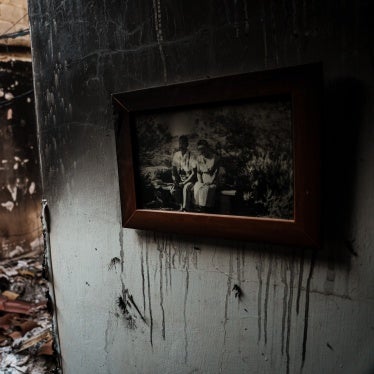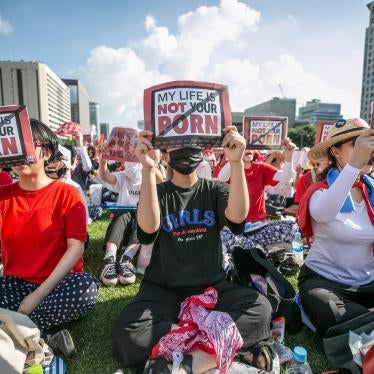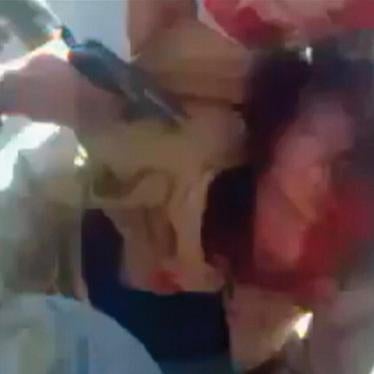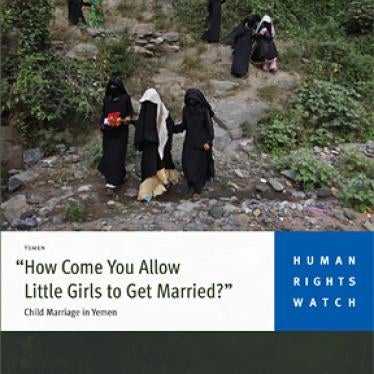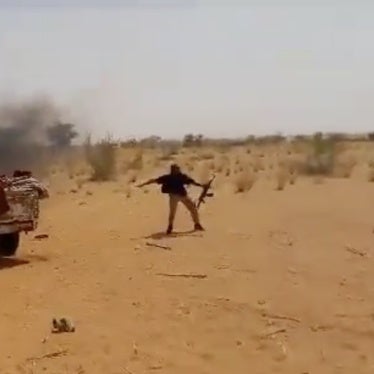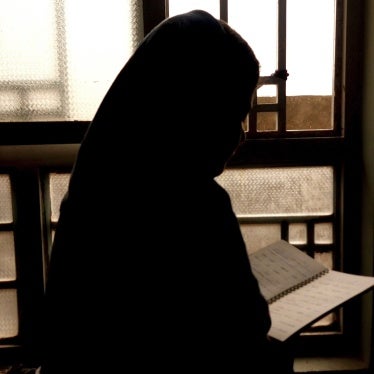Update: On July 19, the UK Foreign Secretary David Lammy announced to the House of Commons that “I can confirm to the House that we are overturning the suspension of UNRWA funding. Britain will provide £21 million in new funds.” Lammy added “we are reassured that UNRWA is ensuring that it meets the highest standards of neutrality and is strengthening its procedures, including on vetting.” With the UK’s decision to restore its financial support to UNRWA, the United States government remains the lone holdout on aid suspension.
(New York) – The governments of the United States and the United Kingdom have yet to restore critical funding to the United Nations Relief and Works Agency for Palestine Refugees in the Near East (UNRWA), Human Rights Watch said. Both governments should act immediately to reinstate their support to the agency, the largest relief organization in Gaza.
On July 12, 2024, the US and UK endorsed a set of shared commitments alongside 116 other governments acknowledging the “extremely critical financial situation” facing UNRWA and “recognizing the serious humanitarian, political and security risks that would result from any interruption or suspension of its vital work.” But neither country has reversed its January decision to cut off funds.
“The US and UK are now shameful outliers as most donors have resumed funding UNRWA,” said Akshaya Kumar, crisis advocacy director at Human Rights Watch. “Cutting off aid was disproportionate to the allegations against UNRWA from the start. Palestinians in Gaza are facing catastrophic food insecurity, massive shortages of medical supplies, and repeated displacement, and there’s no substitute for UNRWA’s networks, experience, and capacity to provide relief.”
The aid cutoffs were based on Israeli authorities’ allegations that 19 people, out of UNRWA’s 30,000 staff, had participated in the October 7 attack in Israel, which Human Rights Watch found included war crimes and crimes against humanity. An independent review released on April 20 and a published update on ongoing inquires by the UN’s own internal investigators both stated that they have not found evidence, or been supplied the evidence by Israeli authorities, to support the key allegations.
Ninety percent of Gaza’s population have been displaced or forced to flee their homes, many repeatedly, and 96 percent are projected to face crisis or worse levels of food insecurity by September.
According to the UN Office for the Coordination of Humanitarian Affairs, pregnant women in Gaza are finding it increasingly challenging to access the lifesaving care they need, and some emergency deliveries are taking place in tents without medical support. Comprehensive emergency obstetric and newborn care are available at only 11 facilities, where dire fuel shortages are hampering the functioning of incubators and other equipment.
In a July 14 statement, an UNRWA official described the conditions at Nasser hospital, where “many patients were treated on the ground without disinfectants,” there were “not enough beds, hygiene equipment, sheeting, or scrubs,” and he saw “toddlers who are double amputees, children paralyzed and unable to receive treatment, and others separated from their parents.”
UNRWA Commissioner-General Philippe Lazzarini told a pledging conference at the UN that UNRWA still faces a financial crisis and “the Agency’s ability to operate beyond September depends on Member States disbursing planned funding and making new contributions to the core budget.” UNRWA relies primarily on donations from individual governments to fund its work in Syria, Lebanon, Jordan, Gaza, and the West Bank, including East Jerusalem. Contributions by governments to UNRWA are voluntary and discretionary.
In January, UNRWA immediately terminated the contracts of 10 of the staff members allegedly involved in the October 7 assault. Two others had died by the time accusations were made public. The UN’s internal investigator, the Office of Internal Oversight Services, opened investigations into all 12 UNRWA staff members initially identified and later added 7 more, but subsequently suspended inquires in 4 cases for insufficient evidence and closed one case because Israel had not provided any supporting evidence. Inquiries into the other cases are ongoing.
Separately, the UN secretary-general appointed an independent panel headed by former French Foreign Minister Catherine Colonna to assess UNRWA’s neutrality. The panel publicly released its own report with 50 recommendations in April, and UNRWA has since set up an internal task force to oversee implementation of the recommendations.
In response to Israel’s allegations in January, UNRWA said 16 countries suspended their donations to the agency and others indicated they would set conditions on further funding. The vast majority, including Australia, Austria, Canada, Estonia, Finland, Germany, Iceland, Italy, Japan, Latvia, Lithuania, Romania, and Sweden, have since resumed payments.
Other donors, including France, Denmark, Switzerland, New Zealand, and the European Union, never suspended donations and instead released funds they had previously planned to give to the UNRWA over time, keeping some remainder in tranches subject to certain conditions. The Netherlands had already disbursed its annual contribution to UNRWA before the allegations emerged in January but announced it would pause further funding. In June, the Netherlands earmarked and indicated willingness to release further funding as UNRWA implements the independent panel’s recommendations.
In early March, UNRWA provided the EU with “written confirmation” that it would “deliver on agreed conditions and measures,” including an audit, strengthened internal controls, and screening and vetting of staff.
Governments including Belgium, Ireland, Luxembourg, Norway, and Slovenia never cut off or slowed funding and called on others to keep funds flowing, while others like Iraq, Qatar, and Spain increased their donations as the humanitarian situation in Gaza worsened.
Historically, the US has been the largest donor to UNRWA, accounting for a third of the agency’s budget in 2023. After the Biden administration announced in late January that it was pausing payments, Congress passed a law prohibiting any further funding to UNRWA until at least March 2025. Officials in the Biden administration told Human Rights Watch it diverted the funds intended for UNRWA to other aid agencies for use in Gaza.
The UK’s newly elected Labour government has yet to announce a change in policy, leaving the previous government’s UNRWA suspension in place. While in opposition, David Lammy, now the foreign secretary, and other senior Labour party members publicly criticized the Conservative government for its January decision to cut aid to UNRWA and urged it to restore funding. Lammy indicated on July 15 that he would make a statement to parliament in the “coming days” on UNRWA.
Philippe Lazzarini, UNRWA commissioner-general, said that the agency has also faced a sustained campaign of reputational, legal, and physical attacks by Israeli authorities. On January 31, Prime Minister Benjamin Netanyahu told a delegation of UN ambassadors that “UNRWA’s mission has to end,” while Foreign Minister Israel Katz has made clear his intention that UNRWA will “not be part of the day after.” In February, Finance Minister Bezalel Smotrich blocked the delivery of a US funded shipment of flour to UNRWA, forcing the delivery through the World Food Programme instead.
Israeli authorities are also seeking to rescind the tax exemptions UNRWA receives and have made moves to shut down UNRWA’s offices located on Israeli state property, limit the length of visas for international UNRWA staff, and refuse visas to staff.
Human Rights Watch has documented two strikes that hit UNRWA aid workers who had communicated their precise GPS coordinates to Israel for their presumed protection, one on a guest house in December 2023 and the other on a convoy in February 2024.
“By continuing to withhold funds, the US and UK are exacerbating the effects of the Israeli government’s campaign against UNRWA and the people who depend on the agency,” Kumar said. “These governments say they’re concerned about the starving people of Gaza, but they’re starving the agency best placed to feed them.”
